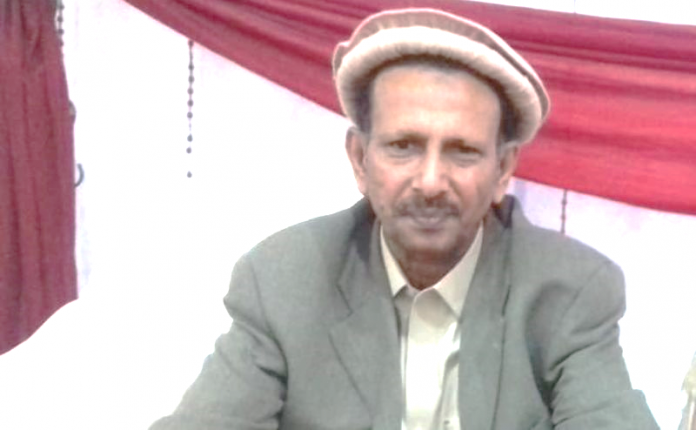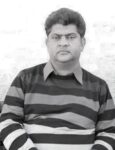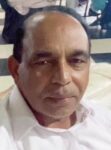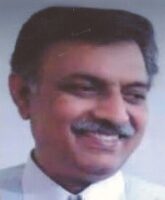Ordinarily, our reports mention briefly an incident in which an Ahmadi is target-killed for his faith. We give the name of the victim, the date and time of the attack, its location and sometimes a few sentences on the circumstances in which the murder was committed. These reports do not go deep into the history of the case nor describe in adequate detail the plight of the family, before and after the attack. But archives should contain and provide some narrative to assist future historians, scholars and inquirers in better understanding the whole scenario.
To that end, we provide here the story of one such family, as a sample. Perhaps someone, someday, would write a whole book on such an affected family, but here, again we have to be brief for constraints of space and time. The reader may assess the relevant details on his own.
Mr. Shahzad Ahmad son of Mr. Abdul Qadir of Peshawar KPK, Pakistan
Mr Shahzad Ahmad, 35, has completed an M.Phil. in education with distinction from Sarhad University of Sciences and Information Technology, Peshawar. A promising student from the start, he earned a gold medal each in his undergraduate, master as well as postgraduate degrees. At the start of 2021, he was teaching at Sarhad University and Allama Iqbal Open University. In the evening, he would commit a few free hours to tuition. His future plans included pursuing his PhD research in Education. However, behind the façade of a normal life was a very fearful and anxious Shahzad. He had lived his life in a place where everyone around him despised him for his faith.
His family had been living in Peshawar for more than 40 years. Including Shahzad, 4 brothers and 5 sisters were born and grew up in the city they loved. The city, however, never loved them back. He recalls facing discrimination and hate even in his school years. Being labelled an infidel or a non-Muslim was something that had become a norm for him and his siblings. In 1997, his father, Abdul Qadir built a house in the city in the hope of providing a home for his family. Abdul Qadir used to work in a clinic. In 2009, he was severely injured in a targeted attack when at work but survived miraculously. The family rented out the house they were living in and moved to another town. Shahzad Ahmad recalls how they felt safer there but still feared that someone would come from Peshawar and attack them. For 9 months they stayed there. However, as soon as they felt that things had settled down, they moved back to their beloved city, Peshawar. Initially, they rented a house inside Peshawar University where it seemed safer. However, they had to hide their identity of being Ahmadi, to protect themselves from hateful gazes, but every time, someone would find out, making it impossible for them to continue to live in the same house.
Therefore, in the course of the next eleven years, the family had to change residences 10 times. Shahzad Ahmad recalls, how during the time his siblings were studying in different schools but were facing similar treatment of hatred and bigotry from fellow students and teachers. Trying their best to hide their identity, some of the younger siblings did not understand the crime they had committed for which they were being so severely punished.
Meanwhile, Abdul Qadir continued to work at the clinic where he was attacked. Although armed guards stood at the gate, Abdul Qadir’s wife and children feared for his safety. With each passing day, they became more anxious and afraid. Peshawar was ruled by PTI, Mr Mahmood Khan in the province and Mr Imran Khan in Islamabad. The year 2020 saw a new wave of anti-Ahmadiyya propaganda in Peshawar which led to the murder of many Ahmadis in targeted attacks. Abdul Qadir and his family felt petrified. This led to the decision to move some of the members of the family out of Peshawar. Abdul Qadir stayed back and started living in the clinic. Shahzad Ahmad rented a hostel room near Sarhad University where he was teaching, whereas a younger brother Farhan Ahmad resided in a private hostel in the city. The severe persecution and constant fear had led them to this difficult decision of splitting their family; however, the ones that moved out continued to worry for the ones that stayed back.
Then the dreadful day arrived. On the 11th of February 2021, a youth shot Mr Abdul Qadir in his clinic. The attack proved fatal. The family was shocked and traumatized, Shahzad Ahmad took the body of his deceased father to far away Rabwah for burial. They left behind all their belongings and said goodbye to their beloved city once again.
The government, says Shahzad, continues to turn a blind eye towards these atrocities resulting in a sort of support to the ones calling out for the annihilation of the Ahmadiyya community. He and his family, he says, do not feel safe or protected in Pakistan. Three of his sisters are married and living abroad but were unable to come to Pakistan for their father’s funeral due to concern for their safety. His mother, Sajida Begum is living in fear and shock and constantly worries about her children, not allowing them to go back to Peshawar to continue with their jobs. Sajida Begum, Shahzad Ahmad says, is scared of losing another member of the family.
The fear continues to consume the family of Abdul Qadir. Even before his death, his son Ihtisham Ahmad, a graduate student developed severe depression due to the persecution the family was facing in Peshawar. Changing residences and hiding their identity to keep safe took a toll on his mental health so that he had to be admitted to a psychological treatment centre in Lahore. In order to protect him, the family has not told him of his father’s death.
Farhan Ahmad, another son of Abdul Qadir completed his BBA from Peshawar and was planning to start his MBA before the tragic death of his father. His plans were shattered. The two younger siblings Talha Ahmad and Noor ul Iman were unable to continue with their studies in Peshawar. At the age of 15, Noor ul Iman had to bear the tragic loss of her father and although she puts on a brave face for her mother, she feels unsafe and depressed. Shahzad, himself is teaching in a school in a faraway town and feels greatly restricted about career development in Pakistan. The clinic, their father worked in for decades, has been shut down. Another Ahmadi who was working there saw his house attacked by a large crowd calling for his head. The victim has, since then, left everything behind and moved out of Pakistan.




